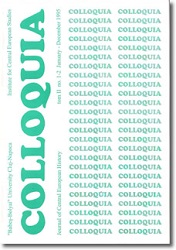Colloquia. Journal for Central European History
Colloquia. Journal for Central European History
Publishing House: ASOCIAŢIA COLLOQUIA
Subject(s): History
Frequency: 1 issues
Print ISSN: 1223-5261
Status: Ceased Publication
- 2009
- 2010
- 2011
- 2012
- Issue No. XVI
- Issue No. XVII
- Issue No. XVIII
- Issue No. XIX
Articles list
{{ article.TitleOriginalLanguage }}
{{ article.TitleOriginalLanguage }}
({{ article.TitleEnglish }})
- Publication: {{ article.Publisher }} ({{ article.Issue }})
- Author(s): {{ article.Authors }}
- Contributor(s): {{ article.Contributors }}
- Language: {{ article.Language }}
- Subject(s): {{ article.Subjects }}
- Issue: {{ article.Issue }}
- Page Range: {{ article.PageRange }}
- No. of Pages: {{ article.NumberOfPages }}
- Keywords: {{ article.Keywords }}
- Summary/Abstract: {{ article.SummaryAbstract }}
- Price: {{ common.currency(article.Price) }}
Short Description
Founded in 1994, Colloquia. Journal for Central European History is published in English by the Institute of Central European Studies of the Faculty of History and Philosophy of the „Babeş-Bolyai” University of Cluj, as a peer-reviewed academic periodical. The journal targets a broader public outside Romania in an attempt to familiarize it with historical research from central and east central Europe, that is, from Austria, Hungary, the Czech Republic, Slovakia, Croatia, Poland and Romania. Thus, Colloquia wishes to facillitate communication not just between east-central European and western scholars, but also to foster intra-regional communication, often obstructed by exlclusive publication in local languages. Starting from this idea of informing a west European public about research in central and east central Europe, the periodical attempts to include a significant number of reviews of books published in this region. In agreement with the suggestion included in its title, the journal tries to foster a culture of communication. This purpose is achieved by making research accessible through publication in English and by initiating and publishing discussions focused on the themes of the issues, favoring topics of interest in the broader European historiography and by including conference presentations as well as a rich review section. The periodical aims to keep up with the most recent developments in the field and to offer its readers a clear idea concerning the latest trends in the research area.

